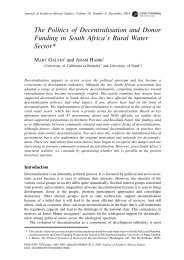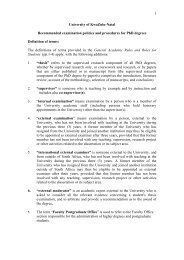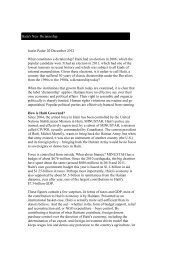Land Reform in South Africa: An Overview - Centre for Civil Society
Land Reform in South Africa: An Overview - Centre for Civil Society
Land Reform in South Africa: An Overview - Centre for Civil Society
You also want an ePaper? Increase the reach of your titles
YUMPU automatically turns print PDFs into web optimized ePapers that Google loves.
and cronyism <strong>in</strong> land allocation. However, the primary purpose of land re<strong>for</strong>mshould revert to *304 alleviat<strong>in</strong>g poverty and to ensur<strong>in</strong>g a dignifiedexistence <strong>for</strong> the majority of the citizens.Despite the fact that the state has not achieved its ambitious target set <strong>in</strong>1994, there is clearly progress <strong>in</strong> land redistribution and it has come about<strong>in</strong> an orderly manner. Accord<strong>in</strong>g to a recent study, 1.4 million hectares weretransferred to approximately 130, 000 beneficiaries between 1994 and 2002.[FN82] This is only 1.7% and a long way from the 30% target but it is,nonetheless, progress.TENURE REFORMTenure re<strong>for</strong>m is <strong>in</strong>tended to provide secure tenure <strong>for</strong> those liv<strong>in</strong>g <strong>for</strong> along time on land owned by others without secure rights. The targeted persons<strong>in</strong>clude farm workers, <strong>for</strong>mer farm workers, sharecroppers, as well as labourtenants. The policy also aims at protect<strong>in</strong>g people liv<strong>in</strong>g on communal landwithout secure rights. As section 25 (6) of the Constitution puts it: "Aperson or community whose tenure of land is legally <strong>in</strong>secure as a result ofpast racially discrim<strong>in</strong>atory laws or practices is entitled to the extentprovided by an Act of Parliament, either to tenure which is legally secure orto comparable redress." Because of the segregation and apartheid policies thatdenied black people access to land, many migrated to the cities or tocommercial farms <strong>in</strong> search of employment. They never acquired ownership orother secure rights on land and stayed on land on the basis of a governmentpermit or permission to occupy or with the consent of the landowner. Thismeant that such permission or consent was liable to be withdrawn at any timewith the consequence that the occupier became a squatter. As discussed above,the notorious Prevention of Illegal Squatt<strong>in</strong>g Act 52 of 1951 was frequentlyused to evict such occupies and move them to the crowded black homelands. Inthe communal land areas (ma<strong>in</strong>ly the <strong>for</strong>mer homelands), occupiers hold landunder customary law, which does not permit <strong>in</strong>dividual ownership as understood<strong>in</strong> the western type common law. Instead, they have use rights under customarylaw, which though traditionally secure, can be arbitrarily taken away bycorrupt chiefs. With the new democratic dispensation, it was necessary toimprove security of tenure <strong>for</strong> all vulnerable occupiers of land. It is <strong>in</strong> thiscontext that constitutional provision *305 was made requir<strong>in</strong>g the state topass an Act of Parliament provid<strong>in</strong>g <strong>for</strong> security of tenure to those with<strong>in</strong>secure use of land.Parliament did not pass one piece of legislation provid<strong>in</strong>g <strong>for</strong> security oftenure but rather a number of laws address<strong>in</strong>g the needs of differentcategories of landholders. The major ones are the <strong>Land</strong> <strong>Re<strong>for</strong>m</strong> (Labour Tenants)Act 3 of 1996, which protects labour tenants, and the Extension of Security ofTenure Act 62 of 1997 [ESTA], which protects other occupiers of rural landwith consent of owners. A less significant law is the Interim Protection ofIn<strong>for</strong>mal <strong>Land</strong> Rights Act 31 of 1996 (IPILR) that was enacted as a temporarymeasure to provide protection <strong>for</strong> de facto occupation, particularly <strong>in</strong> thepage 13 of 28
















